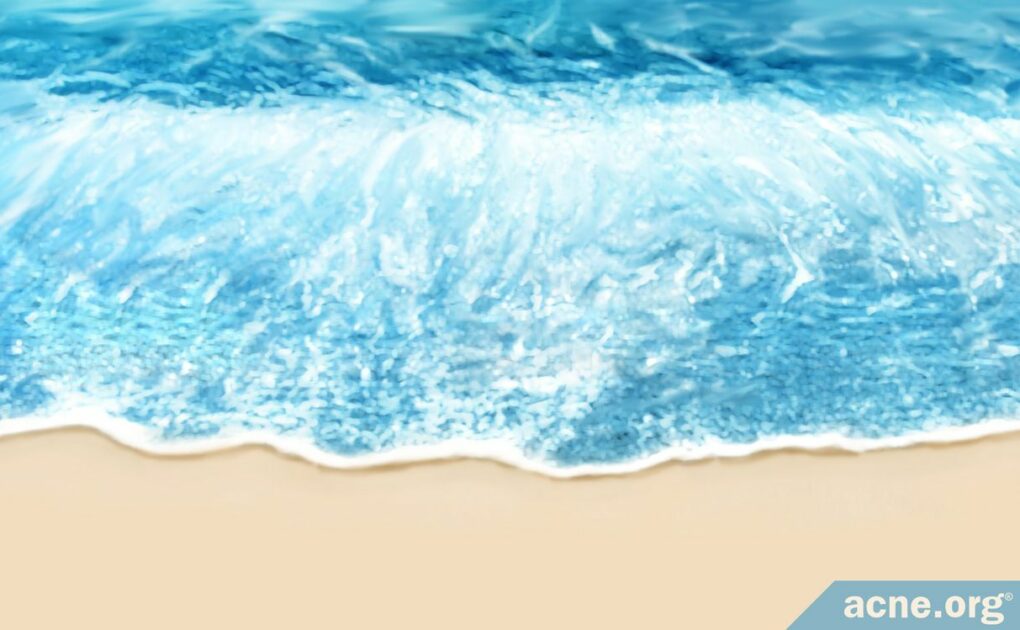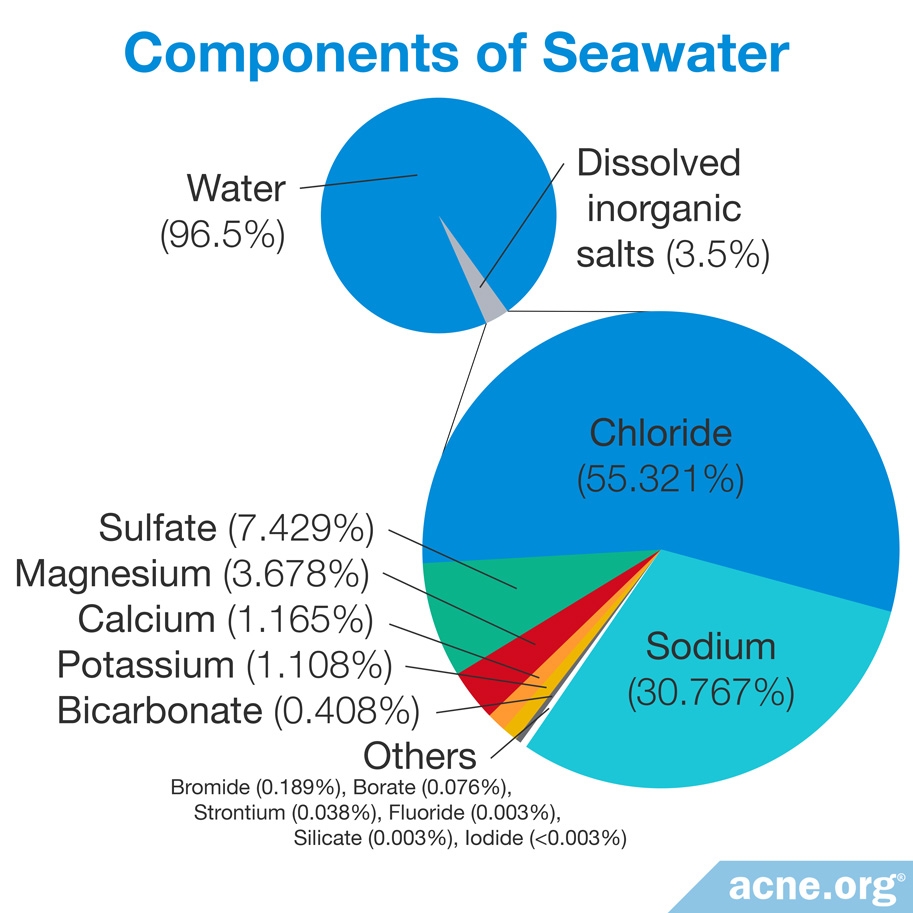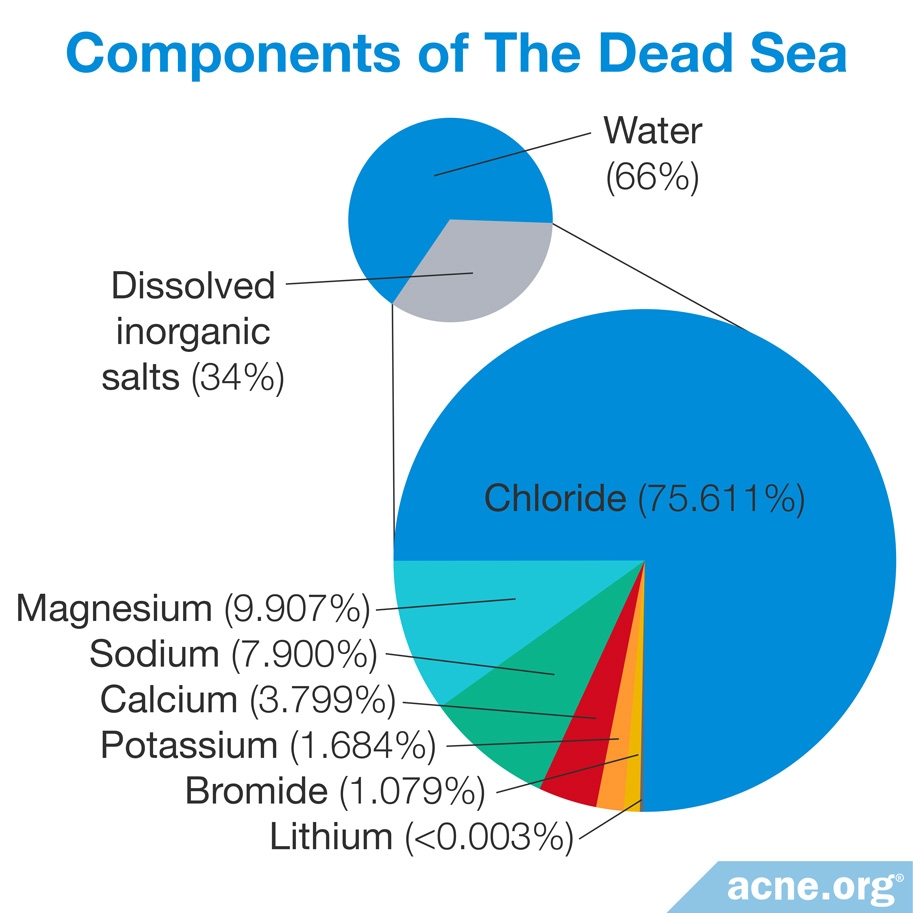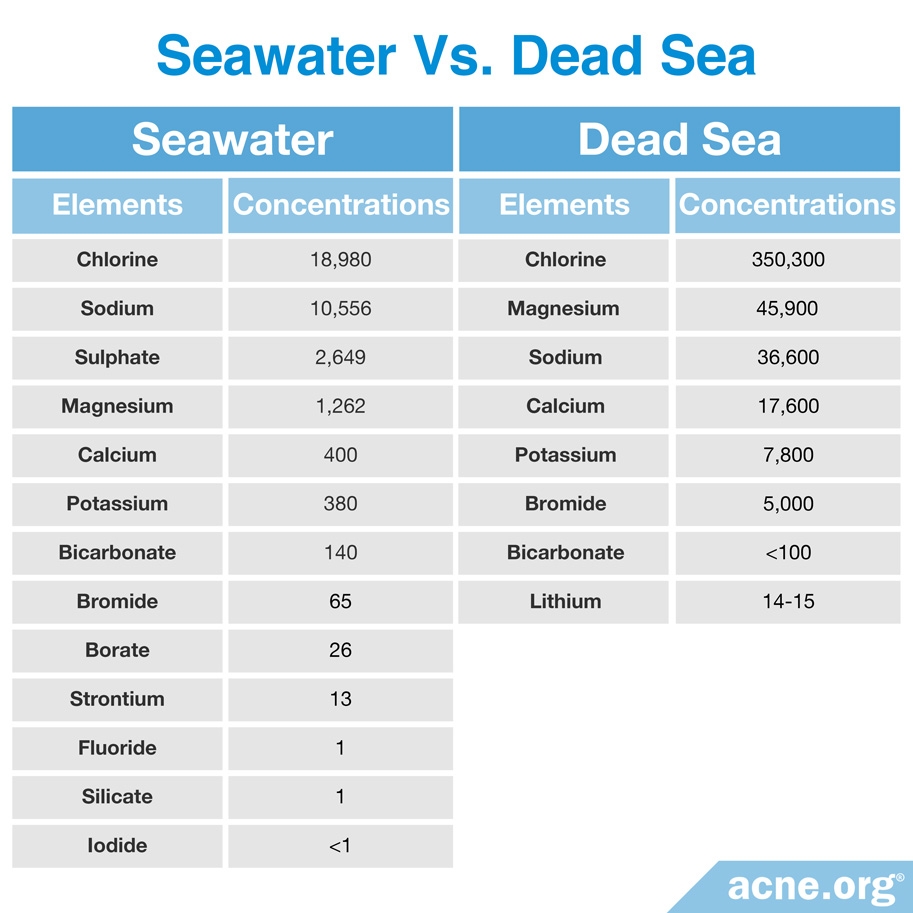It Won’t Hurt and Just Might Help

The Essential Info
There is no evidence that seawater can negatively affect any skin disease, including acne. If you are acne-prone, you can safely swim in the sea.
However, take the following precautions:
- When drying off, very gently pat your skin dry to avoid physically irritating the skin.
- Try to time swimming activities so you can perform your morning or evening anti-acne regimen after you swim.
- Protect your skin from too much sun exposure using non-pore-clogging sunscreens.
It is also safe to swim in a pool, but because of the potentially beneficial effects of dissolved mineral salts in seawater, when given a choice, choose swimming in the ocean/sea over swimming in a pool.

The Science
- Effects of Seawater on Acne and Other Skin Conditions
- Beneficial Effects of Minerals Found in the Dead Sea
- Studies That Use Dead Sea Water for Acne
- Studies That Use Dead Sea Salt for Psoriasis
- How Dead Sea Salts May Improve Skin Barrier Function
- Takeaway from These Studies
- TIP!
- Sun Exposure
Over all the years of dermatological studies, we have seen no evidence that seawater is bad for the skin. But is swimming in seawater good for the skin?
This is hard to say for sure since there are no direct studies specifically on seawater and acne, but we do have studies on how Dead Sea water might potentially improve acne and other skin issues. Seawater contains 3.5% of dissolved mineral salts. The Dead Sea contains 34% of similar dissolved mineral salts.
There is one weak study that shows that Dead Sea salts might be therapeutic for acne, and there are stronger studies that point toward the positive effects of Dead Sea salts on psoriasis and on the skin’s barrier function. Taken together, the preponderance of the evidence at this point shows us that swimming in the ocean/sea is not bad for acne, and might actually help a bit.
Effects of Seawater on Acne and Other Skin Conditions
Our own bodies are slightly salty, containing about 0.9% sodium chloride (salt). Because of this, medical professionals use a saline solution of the same concentration, not fresh water, for infusions and to flush wounds.
Considering that doctors use low-concentration salt water to treat wounds, and, officially speaking, acne lesions are wounds, it makes common sense that the slightly higher salinity in seawater should at the very least not harm acne-prone skin or worsen the symptoms.
To add to this, bathing in mineral-rich water, such as in the Dead Sea, has been a tradition since antiquity, and there are studies on the beneficial effect of Dead Sea salts on skin conditions such as psoriasis. Furthermore, as I have mentioned, there are studies showing that Dead Sea salts can improve the skin’s barrier function.4 This is important since people with acne tend to have an impaired barrier function. These studies may give us clues to the potentially beneficial effects of typical seawater. Let’s have a look at the beneficial effects of minerals found in the Dead Sea.
Beneficial Effects of Minerals Found in the Dead Sea
The Dead Sea is the richest natural mineral source in the world, containing 34% dissolved minerals. It also contains a higher percentage of beneficial minerals when compared with other seawater around the world.
Let’s have a closer look at studies on how the admittedly much more concentrated and potentially more beneficial Dead Sea water might help with acne and likely helps with other skin diseases. As you read, remember that regular seawater is only about 1/10 as concentrated and may contain less of the beneficial minerals. However, if the Dead Sea helps, it is safe to assume that regular seawater may confer at least some degree of benefit as well.
Studies That Use Dead Sea Water for Acne

Only one, relatively weak study has specifically reported on how the Dead Sea could affect acne. The authors stated, “[A]ll 86 patients treated for acne at the Dead Sea between 1992 and 1995 demonstrated a significant improvement, with a reduced number of comedones (clogged pores) and pustules (pimples).”7 The authors did not give statistics or mention controls, so results should be interpreted with caution.
Not overly impressed with that study? Me neither. However, studies on the beneficial effects of Dead Sea water on psoriasis and the skin barrier may help underline the benefits of seawater for acne patients. We’ll look at those next.
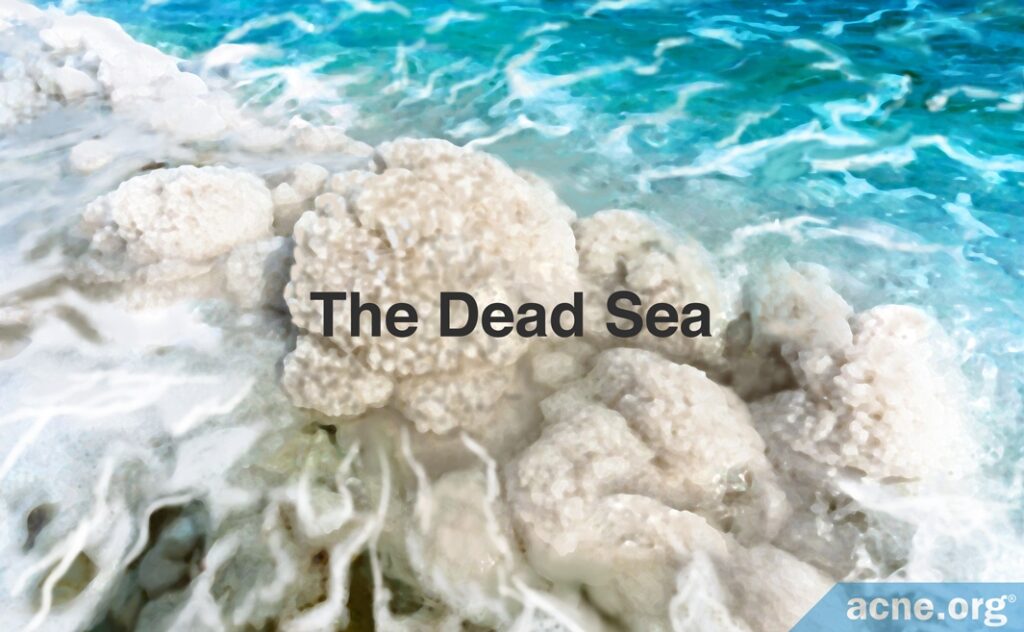
Studies That Use Dead Sea Salt for Psoriasis
Acne and psoriasis both are skin diseases that include as part of their development the overgrowth of skin cells. For this reason, the studies on psoriasis may help us to understand how seawater might affect acne.
Psoriasis typically includes symptoms of red, itchy, and scaly skin. Treatment at the Dead Sea is recommended for this condition because of the combination of Dead Sea water and sun exposure on its shores. However, keep in mind that while there are some similarities between psoriasis and acne, treating acne with sun exposure is unlikely to produce the same benefits as it does with psoriasis.
One study published in 1997 found that bathing in Dead Sea salt water reduced psoriasis symptoms, suggesting that it’s possible that swimming or bathing in seawater might be helpful for acne as well.8
Expand to read details of study
A different study published in 2008 looked at the combination of bathing in Dead Sea water and sunbathing on the shores of the Dead Sea as a treatment for psoriasis.9 While the treatment significantly reduced psoriasis symptoms, it is important to note that excessive sun exposure might not be beneficial for acne and might actually trigger acne symptoms.
Expand to read details of study
Studies Showing How Dead Sea Salts May Improve Skin Barrier Function
While evidence is mixed, people with acne may tend to have an impaired skin barrier. Studies show that Dead Sea water may help improve skin barrier function. Anything that improves the skin barrier may help improve acne.
Two studies have found that salt water from the Dead Sea, when used for washing the skin or when incorporated into a topical cosmetic gel, improves skin barrier function.4,10 In addition, one study found that Dead Sea water can strengthen the skin barrier and reduce inflammation in skin cells grown in the lab.11
Expand to read details of studies
Takeaway from These Studies
While there is only one weak study on the beneficial effects of seawater on acne-prone skin, the studies showing that Dead Sea water may improve psoriasis and skin barrier function indicate that regular seawater, which is similar to water from the Dead Sea, albeit at much lower concentration, may also offer beneficial effects, but likely to a lesser degree than water from the Dead Sea.
Seawater Itself Does Not Cause any Skin Diseases
In 2010, researchers published in the International Journal of Dermatology a comprehensive review of skin diseases caused by bathing in the sea:
Contact with organisms that live in the sea, not the seawater itself, caused the vast majority of skin conditions they investigated. The authors mentioned that to date no study has described a detrimental effect of seawater itself on the human skin. Swimming in the sea not only is harmless but may impart mild therapeutic effects on skin diseases such as psoriasis, atopic dermatitis, and perhaps acne.12
TIP: Perform Your Anti-Acne Regimen After Swimming When You Can
Over-washing the skin is one of the most irritating things you can do to your skin. For people with acne, it’s important to wash no more than twice per day. Getting your skin wet in the ocean/sea, or getting it wet in any other way for that matter, is tantamount to washing the skin. So, whenever possible, try to time your swimming activities so that you can perform your anti-acne regimen after swimming.
Stay gentle with your towel: Roughly drying with a towel is a common form of physical irritation, and physical irritation of the skin can aggravate acne, so gently pat dry when you get out of the ocean/sea.
Sun Exposure
When swimming in the ocean/sea, you are often exposing your skin to the UV rays of the sun. Sunlight is not all bad. It promotes the synthesis of vitamin D in our bodies, which is beneficial to skin health, and may be beneficial for acne. On the other hand, over-exposure to the sun can damage the skin and bite back with acne in the weeks following exposure. A little bit of sun is ok, but make sure to avoid sunburn.
Important: When choosing a sunscreen, make sure you choose a “broad-spectrum” and “non-comedogenic” option. Look for terms like “for sensitive skin” or “for acne-prone skin” when you can find it. And when applying sunscreen, like with any other topical skin care product, use your bare hands and stay gentle in application to avoid physically irritating your skin.
